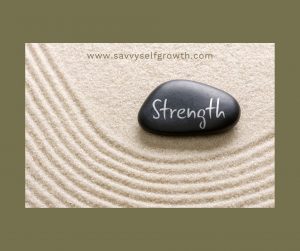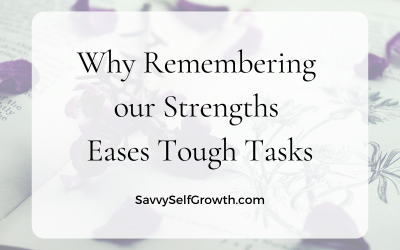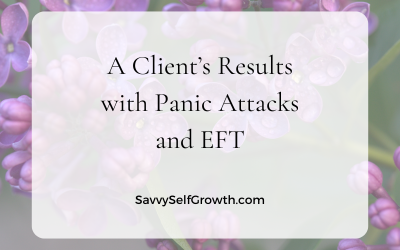 Before we go to CliftonStrengths, let’s have a word about strengths in general.
Before we go to CliftonStrengths, let’s have a word about strengths in general.
First: What is a strength?
Every human being has strengths and weaknesses. It’s not always easy to spot them for ourselves, because they are so normal to us that we’re like a fish in the water with them. Both areas can be in our blind spots.
We may not think our strengths are very special at all because they come so easily to us. Sometimes other people can spot them for us, but they might mistake “You’re so good with that thing you do” for a true strength. Sometimes we actually hate doing that thing they’re talking about – which is most definitely not a strength then.
A strength is not something we’re merely good at. A strength is something that makes us feel energized, alive, strong and we want to keep doing it. They are natural patterns of thinking, feeling and behaving, combined with time investment, which leads to almost perfect results every time we do it.
On the opposite spectrum, we have our weaknesses – the thinking, feeling and behaving that have us feel drained, resistant, weak and “I don’t want to do this ever again!” These patterns (strengths) and non-patterns (weaknesses) are different for each of us.
Sometimes we can identify our strengths by asking friends: “What do you think I do easily and naturally?” Or, we may be able to identify them by thinking of the SIGN’s of a strength:
The Success we’ve had with something, the Instinct you have to keep doing something, how fast you Grow in that area, and how much of a Need it fulfils.
So how does the CliftonStrengths assessment help?
It’s still a challenge to determine with absolute clarity what our strengths are by exploring the above questions. It’s a guessing game that takes time we usually don’t have.
That’s where Gallup University’s CliftonStrengths assessment is incredibly handy.
Donald Clifton (the founder) asked, “What would happen if we studied what was right with people versus what’s wrong with people?”
Gallup University has been doing research into strengths for at least 30 years and have made it easy for us to identify our strengths and weaknesses.
You might know the assessment as Gallup StrengthsFinder. It was renamed to CliftonStrengths after Donald Clifton, the founder, passed away.
How does it work?
This online assessment will provide your unique list of 34 talents in order of ‘strong’ to ‘weak’. It gives us a clear language to explain to ourselves and others where we’re exceptionally strong, what we’re well-developed in, and what tends to drain us.
You can purchase the assessment here, and you can choose between your Top 5, or Full 34. Many people start with Top 5, and then upgrade to the full list. I highly recommend doing the Full 34 right from the start. It will provide you with a more complete picture.
After you’ve purchased the assessment, you can start it right away. It takes about 40 minutes to complete. There are 177 questions, which you need to answer ‘from your gut’ as best you can.
Most people miss a few, and you don’t have to worry about that at all – they test each talent in multiple ways. If you miss too many, the assessment will start over.
As soon as you’ve completed it, Gallup will email you your full report of 34 talents. It’s also available in your online Dashboard.
I’ve heard you say ‘Strengths’ and ‘Talents’ – which is it?
In truth, the report is a list of your talent themes – which are natural patterns of thinking, feeling and behaving. Those are the areas where you have the greatest potential of developing strengths.
When we manage those talents well and add skills and expertise, it can become a strength!
When we miss-manage a talent (oh yes, it does happen!), it can become a detriment to us and those around us.
The list you receive is thus a list of ‘talents’ (areas of greatest potential). It’s a wonderful, worthwhile journey to discover how to turn them into true strengths.
What’s the benefit of knowing our CliftonStrengths?
To date, more than 25 million people worldwide have taken the assessment, and it’s growing every day. Clearly, there is a need and hunger for people to understand their potential and to feel affirmed.
Knowing our talents helps us to know where to focus most of our energy. The Strengths and Positive Psychology movements promote focusing our energy and attention to aim our strengths towards our goals, instead of trying to fix any weakness. We don’t ignore the weakness at all – in fact, we learn how to manage around those, so that we can live a fulfilling, energized life.
Our strengths are working all of the time, whether we’re aware of it or not – especially in difficult times. It’s helpful to know that we default even more to our patterns when things are tough…. so when we can grow our talents into fully fledged strengths, we have a whole ‘team of specialists’ on board for difficult moments.
When I discuss their strengths with clients, they say things like:
- “You mean I’m not crazy for being this way?”
- “REALLY?? This is a strength?! I thought it was just the way I am!”
- “For the first time, I understand this part of myself”
- “I love knowing this is a strength – I thought everyone could do it because it’s so easy for me!”
Some have tears in their eyes because they feel so validated and acknowledged. Some put down burdens of judgment they’d been carrying for years, and others smile very, very broadly. Everyone feels empowered and energized knowing that they have amazing superpowers they used to take for granted.
What questions do you have?
I have many more articles to write about this topic. Your question can help me determine which is next. Submit your question here, or in a comment below – I’d love to answer it.




